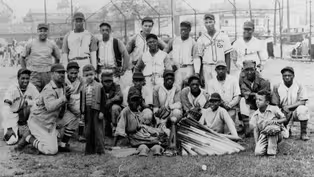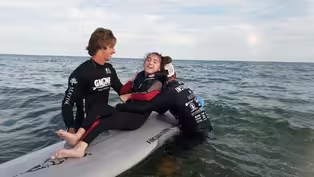
Trans-Formation
Clip: Season 4 Episode 34 | 8m 10sVideo has Closed Captions
An in-depth profile of a transgender teenager who talks about her new life.
We take a second look, more than a year after profiling a local, transgender teenager as she began seeking her new identity. She provides an update on the physical and emotional changes and challenges confronting her on a daily basis. She also reveals what she has had to leave behind in the journey towards becoming her true self.
Problems playing video? | Closed Captioning Feedback
Problems playing video? | Closed Captioning Feedback
Rhode Island PBS Weekly is a local public television program presented by Ocean State Media

Trans-Formation
Clip: Season 4 Episode 34 | 8m 10sVideo has Closed Captions
We take a second look, more than a year after profiling a local, transgender teenager as she began seeking her new identity. She provides an update on the physical and emotional changes and challenges confronting her on a daily basis. She also reveals what she has had to leave behind in the journey towards becoming her true self.
Problems playing video? | Closed Captioning Feedback
How to Watch Rhode Island PBS Weekly
Rhode Island PBS Weekly is available to stream on pbs.org and the free PBS App, available on iPhone, Apple TV, Android TV, Android smartphones, Amazon Fire TV, Amazon Fire Tablet, Roku, Samsung Smart TV, and Vizio.
Providing Support for PBS.org
Learn Moreabout PBS online sponsorshipa date in freshman year and I had no type of sexual attraction to her at all.
I found her very pretty.
I wish I was her.
I couldn't get myself to realize that thought, and I wouldn't believe it until much, much more later on.
- Welcome to Gender Spectrum.
We're be here for about an hour, talk about whatever we wanna do with... - Back then, "Katie Adams," as she now calls herself, was attending Gender Spectrum sessions at Youth Pride, a nonprofit serving the LGBTQ community, and she was living at home.
Oh, tell me about this picture here.
- Oh, this is a picture of when we went to Comic-Con.
- And so, you're a big Star Wars fan?
- Yeah, I really, I really did enjoy, I still do.
I still enjoy comic books and Star Wars.
- Typical kid.
- Yeah, typical kid.
- So you didn't know you were transgender?
- No, I did not know.
Discovering it was very rocky.
It was very, very rocky.
(music playing on phone) - Adams says, she took the first step on that rocky road by doing the most masculine thing she could think of, enlisting in the Marines.
- However, it did not work because no matter how hard you try, it's not going to go away.
I am just a trans woman.
I've pushed this back my entire life.
It's a feeling that repeatedly shows up.
I feel that I should be a girl.
I feel that I should be looked at as one because I am one.
- When we first met Adams, who is now 19, had just started hormone replacement therapy, HRT.
Well, it's been nine months since you've been on the journey.
That's when we last spoke to you.
Can you tell us how these last nine months have been for you?
- It's been, it's been pretty rough.
It's like a second puberty.
It's hard, it's really hard.
And sometimes, a lot of people who are transitioning don't have that support and you need to find it.
- Adam's support from her family eroded so she had to move out.
She now lives at Haus of Codec, a shelter in Providence for the LGBTQ community.
- What happens with people who normally try to transition is a family can see somebody who you used to be, compared to who you wanted to be, and it can really separate the two.
Perfect example is, this Christmas I went to go receive gifts and a lot of the gifts weren't the name that I wanted to have.
- And what is that name?
What do you call that name?
- That would be a dead name.
That's a name that is, was given to you and doesn't match what, how you felt inside.
- What else have you noticed about changes within?
Despite the emotional toll, Adams is encouraged by the physical changes she's beginning to see.
- It definitely does feel like something that I wish I could have done when I was younger.
So it's, it's very euphoric.
- Your hair has, you've grown out your hair since last we saw you.
What other physical changes has the medication brought?
- I've had a lot of fat distribution.
That is for sure.
It's been a lot in the chest as well with the waist and a lot of, and sometimes reconstructing the face a little bit.
I remember my doctor (traffic whoosing) talking to me about the changes that I'll go through.
- Adams also says her skin is getting softer.
She's had electrolysis to remove her facial hair and is beginning to dress more feminine.
Katie, a lot of people would say, you're awfully young to have made these decisions and to be so committed.
What do you say?
- So, am I really young?
Or am I just being who I've been keep on saying I am?
And I've just been keep on getting turned down.
- [Pamela] Reliable data is hard to come by, but anecdotally, many mental health providers report more teenagers are coming out as transgender than ever before.
Some say they are inspired by those now in the spotlight, celebrities such as Caitlyn Jenner and Laverne Cox.
In our initial report, we asked Dr. Jason Rafferty about the numbers.
He's a local pediatrician and child psychologist.
- We see evolving sort of identities, people who are non-binary, people who are gender fluid, people who are all these different sort of labels that are starting to emerge to describe diverse experiences.
- [Pamela] Dr. Rafferty also noted the societal shift to be more inclusive has some staunch critics.
At least 20 states have introduced anti-trans gender legislation aimed at everything from restrooms to sports.
- I think we've seen this before, whether it's with issues of race or sexual orientation, that as we try to become a more accepting culture, there's always some resistance.
- [Pamela] Rhode Island has been fairly accepting.
It has a comprehensive anti-discrimination law concerning sexual orientation.
And in 2001, gender identity was added to protections in housing, credit and employment.
Adams is currently job hunting after, she says, harassment while working at a local cinema complex became overwhelming.
- A lot of it came from customers because there's no type of like barriers customers have to how they speak to you.
- What would they say?
- They would say a lot of hurtful types of words.
Specifically, words towards trans community in general or the LGBTQ community.
A lot of just asking me to go back to where I came from.
- How do you find the resolve within yourself to go forward?
- I guess I have to admit there's some part of me that wants to prove people wrong.
I really do wanna prove to my family that of who I am and despite them telling me of who I always am going to be.
- Are you happy about going down this road?
- Deep down, I used to feel very hollow.
I finally feel like that I am, I'm myself.
And despite I'd feel like that sometimes I'd be an alien, at least I know who I am.
- Adams is currently taking courses at CCRI, Community College of Rhode Island, and says, she'd someday like a profession protecting wildlife.
Do you feel an affinity for animals?
For Creatures?
- Yeah.
Yeah, actually.
They... And the best part about animals is that they're, they don't judge, they're not biased.
And as they say, "A dog is a man's best friend."
- And could be a woman's best friend too.
- Yeah, it could be a woman's best friend too.
Video has Closed Captions
Clip: S4 Ep34 | 8m 26s | An in-depth look at the often-forgotten history of Black baseball in Rhode Island. (8m 26s)
Video has Closed Captions
Clip: S4 Ep34 | 9m 12s | Surfers use surf therapy to help neurodivergent and non-ambulatory teens. (9m 12s)
Providing Support for PBS.org
Learn Moreabout PBS online sponsorship
- News and Public Affairs

Top journalists deliver compelling original analysis of the hour's headlines.

- News and Public Affairs

FRONTLINE is investigative journalism that questions, explains and changes our world.












Support for PBS provided by:
Rhode Island PBS Weekly is a local public television program presented by Ocean State Media

